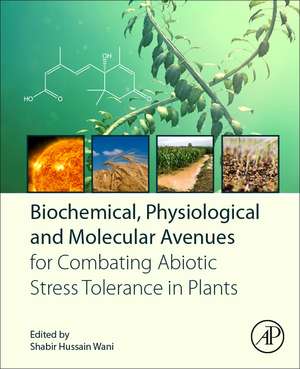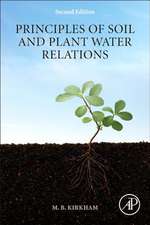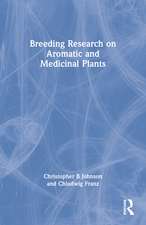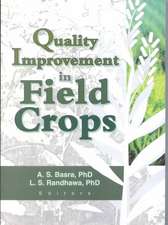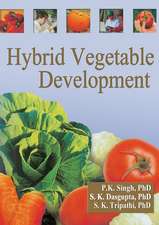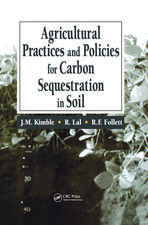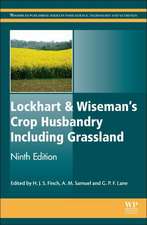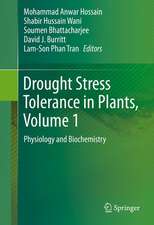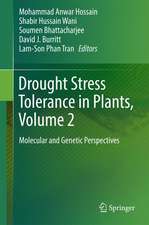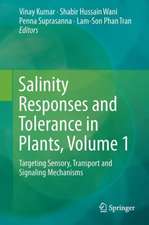Biochemical, Physiological and Molecular Avenues for Combating Abiotic Stress in Plants
Editat de Shabir Hussain Wanien Limba Engleză Paperback – 18 iun 2018
In addition, the book provides a critical understanding of the networks of genes responsible for abiotic stress tolerance and their utilization in the development of stress tolerance in plants. Practical breeding techniques and modern genetic analyses are also discussed.
- Unlocks the physiological, biochemical and molecular basis of abiotic stress response and tolerance in crop plants
- Presents comprehensive information on abiotic stress tolerance, from gene to whole plant level
- Includes content on antioxidant metabolism, marker-assisted selection, microarrays, next-generation sequencing and genome editing techniques
Preț: 912.38 lei
Preț vechi: 1471.47 lei
-38% Nou
Puncte Express: 1369
Preț estimativ în valută:
174.64€ • 189.76$ • 146.79£
174.64€ • 189.76$ • 146.79£
Carte tipărită la comandă
Livrare economică 14-28 aprilie
Preluare comenzi: 021 569.72.76
Specificații
ISBN-13: 9780128130667
ISBN-10: 0128130660
Pagini: 324
Dimensiuni: 191 x 235 mm
Greutate: 0.59 kg
Editura: ELSEVIER SCIENCE
ISBN-10: 0128130660
Pagini: 324
Dimensiuni: 191 x 235 mm
Greutate: 0.59 kg
Editura: ELSEVIER SCIENCE
Public țintă
Students, teachers and researchers in agriculture, plant science, and horticulture as well as those in environmental scienceAdditional audience includes plant-based companies and agribusiness
Cuprins
1. Transcription Factors Based Genetic Engineering for Abiotic Tolerance in Crops
2. Sugars Play a Critical Role in Abiotic Stress Tolerance in Plants
3. Polyamines Metabolism: A Way Ahead for Abiotic Stress Tolerance in Crop Plants
4. Cold Tolerance in Plants: Molecular Machinery Deciphered
5. Impact of Soil Moisture Regimes on Wilt Disease in Tomatoes: Current Understanding
6. Field Performance of Transgenic Drought-Tolerant Crop Plants
7. DNA Helicase-Mediated Abiotic Stress Tolerance in Plants
8. RNAi Technology:The Role in Development of Abiotic Stress-Tolerant Crops
9. Genome-Wide Association Studies (GWAS) for Abiotic Stress Tolerance in Plants
10. Targeting the Redox Regulatory Mechanisms for Abiotic Stress Tolerance in Crops
11. Compatible Solute Engineering of Crop Plants for Improved Tolerance Toward Abiotic Stresses
12. Single-Versus Multigene Transfer Approaches for Crop Abiotic Stress Tolerance
13. Crop Phenomics for Abiotic Stress Tolerance in Crop Plants
14. Overview on Effects of Water Stress on Cotton Plants and Productivity
2. Sugars Play a Critical Role in Abiotic Stress Tolerance in Plants
3. Polyamines Metabolism: A Way Ahead for Abiotic Stress Tolerance in Crop Plants
4. Cold Tolerance in Plants: Molecular Machinery Deciphered
5. Impact of Soil Moisture Regimes on Wilt Disease in Tomatoes: Current Understanding
6. Field Performance of Transgenic Drought-Tolerant Crop Plants
7. DNA Helicase-Mediated Abiotic Stress Tolerance in Plants
8. RNAi Technology:The Role in Development of Abiotic Stress-Tolerant Crops
9. Genome-Wide Association Studies (GWAS) for Abiotic Stress Tolerance in Plants
10. Targeting the Redox Regulatory Mechanisms for Abiotic Stress Tolerance in Crops
11. Compatible Solute Engineering of Crop Plants for Improved Tolerance Toward Abiotic Stresses
12. Single-Versus Multigene Transfer Approaches for Crop Abiotic Stress Tolerance
13. Crop Phenomics for Abiotic Stress Tolerance in Crop Plants
14. Overview on Effects of Water Stress on Cotton Plants and Productivity
